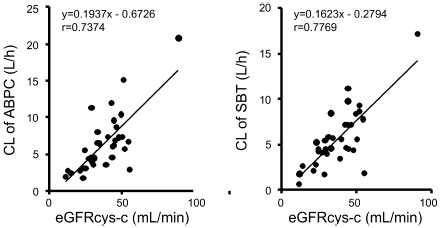6 0 0 0 OA Dosing Optimization of Ampicillin-Sulbactam Based on Cystatin C in Elderly Patients with Pneumonia
- 著者
- Kayoko Matsubara Kazuaki Matsumoto Yuta Yokoyama Erika Watanabe Yuki Enoki Akari Shigemi Kazuro Ikawa Hideyuki Terazono Norifumi Morikawa Tamao Ohshige Yasuo Takeda
- 出版者
- The Pharmaceutical Society of Japan
- 雑誌
- Biological and Pharmaceutical Bulletin (ISSN:09186158)
- 巻号頁・発行日
- vol.44, no.5, pp.732-736, 2021-05-01 (Released:2021-05-01)
- 参考文献数
- 27
- 被引用文献数
- 3
Ampicillin-sulbactam is a first-line therapy for pneumonia and is mainly excreted by the kidney. It is important to optimize the dose and dosing interval of ampicillin-sulbactam because in patients with decreased renal function and low skeletal muscle mass, such as the elderly, excess drug may burden renal function. In this study, we evaluated indices of renal function and optimized the dose and dosing interval of ampicillin-sulbactam based on pharmacokinetics (PK) and pharmacodynamics theory in elderly patients. The serum concentrations of ampicillin and sulbactam were measured by HPLC, and PK parameters were calculated. Correlations between the clearance of ampicillin or sulbactam and renal function were evaluated, and dosing optimization was calculated based on PK parameters. The PK parameters of ampicillin were CL = 6.5 ± 4.0 L/h, Vd = 19.3 ± 0.2 L, Ke = 0.4 ± 0.2, and t1/2 = 2.7 ± 1.6 h. The most correlated renal function index was estimated glomerular filtration rate (eGFRcys-c) calculated by serum cystatin-c (r = 0.7374, correlation formula; CL of ampicillin = 0.1937 × eGFRcys-c−0.6726). Based on this formula, we calculated the clearance of ampicillin and developed dosing regimens for the elderly. Serum cystatin-c concentration is an ideal index to optimize ampicillin-sulbactam antimicrobial therapy in elderly patients with pneumonia.
